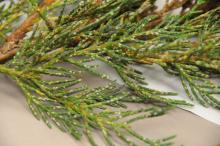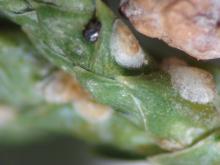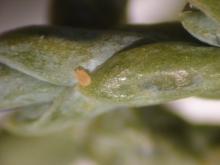Carulaspis juniperi
Pest description and damage Scale insects are small (less than 0.125 inch in length) soft insects that live beneath waxy scales. These insects are often identified by the shape and size of their scales, the description of adult males and females, immature crawler stage, color of eggs, and host plant preferences. The female juniper scale insect is approximately 0.05 to 0.1 inch in diameter beneath a white scale with a notable, central yellow spot. The male scale has a more elongated appearance. Crawlers are pale yellow. This insect feeds on the sap within the stem or leaf. Leaves, twigs, branches, and cones are attacked. Their feeding can reduce the vigor of the foliage supported by that stem. Symptoms of scale feeding include loss of normal color and luster of foliage, no new growth, and yellowing and death of branches. Severe infestations may kill entire plants. Juniper (Juniperus), Leyland cypress (Cuppressocyparis), Lawson cypress (Chamaecyparis), western red cedar (Thuja), and all members of the Cupressaceae family are attacked.
For biology, life history, monitoring and management
See "Scale insect" in:
Management-chemical control
See Table 1 in:




